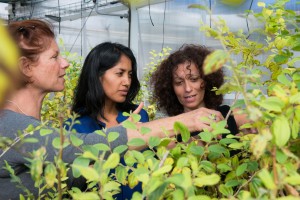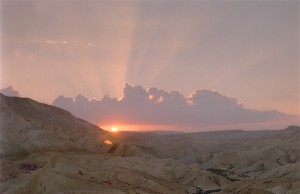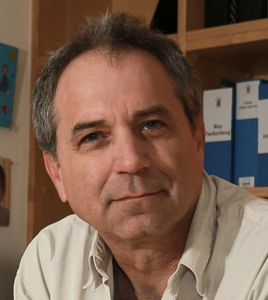The 2020 Drylands, Deserts & Desertification Conference (DDD) begins today and will address one of the most pressing worldwide issues, “Feeding the Drylands: Challenges in a Changing Environment.” More than 40% of the Earth’s landmass is considered drylands, and that percentage rises every year.
The world’s largest desertification-focused conference is being held virtually from November 16-18, 2020. Nearly 2,000 people have registered from 103 countries, including new Israeli ally, the United Arab Emirates, and perennial adversary, Iran. The number of registrants has quadrupled since the previous DDD conference.
Click here for the schedule and speaker topics
Organized by the Jacob Blaustein Institutes for Desert Research (BIDR) at Ben-Gurion University of the Negev, the conference brings together more than 160 top researchers and practitioners in the field from around the world. Registration is free.

Left to Right: Dr. Orna Reisman-Berman,
Graduate Student Maria Dolores Camalle from Ecuador, Dr. Noemi Tel-Zur BGU desert agriculture researchers and students
Photo Credits: Dani Machlis/BGU
The conference is affiliated with the United Nations Convention to Combat Desertification (UNCCD). UNCCD Executive Secretary Ibrahim Thiaw will deliver opening remarks.
The DDD Conference has become a seminal event for those interested in the techniques, policies and practices of combating desertification.
Prof. Noam Weisbrod, director of the Jacob Blaustein Institutes for Desert Research says, “The DDD conference has grown to be the most important and influential conference in the world to deal with sustainability, environmental issues, water scarcity and food security in drylands. In light of the severe global changes the world is facing and their dramatic influence on drylands in general and on the developing countries in particular, the DDD is more significant than ever before.”
The conference will delve into key newsworthy topics unfolding today and will address some of the following topics:
● What is the connection between the climate crisis and desertification, and are humans solely responsible for the crisis?
● What is the connection between desertification and the COVID-19 pandemic? How does desertification affect the food on our plate, and will our nutrition change entirely in another 30 years?
According to Prof. Shimon Rachmilevitch, DDD Conference Chair, “The causes and consequences of desertification affect every creature on the planet, from Acacia trees to the coronavirus, to people. The importance of researching and understanding desertification is part and parcel of understanding climate change. This international conference, sponsored by the UN, is the most important stage in the world to hear, be heard, learn, and draw conclusions which will benefit humanity and the planet.”
Click here for the schedule and speaker topics
About The International Conference on Drylands, Deserts and Desertification (DDD)
The 7th DDD Conference, being presented by Ben-Gurion University of the Negev in Sde Boker Israel, will focus on Feeding the Drylands. Additional sessions will be held on a broad range of topics associated with meeting this challenge in our changing environment including food, water, energy, ecosystems and societies. The International Conference on Drylands, Deserts and Desertification (DDD) has emerged as an important global gathering of scientists, practitioners, industry and government representatives and decision-makers, members of CSOs, NGOs, and international development aid agencies and other stakeholders from over 60 countries concerned about land and environmental degradation in drylands and living conditions in and around them, as well as their sustainable use and development. For more information.
The Jacob Blaustein Institutes for Desert Research (BIDR) is comprised of three research institutes pertaining to desert studies and dryland agriculture, water management and environmental issues with 905 scientists, 60 technical and administrative staff members and over 100 Israeli and foreign research students dedicated to the goal of sustainable development of arid lands. The Institutes balance basic and applied research related to desert science in their pursuit of sustainable development for marginal lands, a definition that applies to nearly 40% of the world’s surface. These diverse research and advanced teaching activities are carried out in the laboratories, classes and other facilities on the BGU Sde Boker Campus, as well as in research stations and field research sites scattered over the Negev desert. Click here to watch a video about the BGU Blaustein Institutes. Visit our website.
Ben-Gurion University of the Negev (BGU) is the fastest growing research university in Israel. With 20,000 students, 4,000 staff and faculty members, and three campuses in Beer-Sheva, Sde Boker and Eilat, BGU is an agent of change, fulfilling the vision of David Ben-Gurion, Israel’s legendary first prime minister, who envisaged the future of Israel emerging from the Negev.
The University is at the heart of Beer-Sheva’s transformation into an innovation district, where leading multinational corporations and start-ups eagerly leverage BGU’s expertise to generate innovative R&D.
BGU effects change, locally, regionally and internationally. With faculties in Engineering Sciences; Health Sciences; Natural Sciences; Humanities and Social Sciences; Business and Management; and Desert Studies, the University is a recognized national and global leader in many fields, actively encouraging multi-disciplinary collaborations with government and industry, and nurturing entrepreneurship and innovation in all its forms.
BGU is also a university with a conscience, active both on the frontiers of science and in the community. Over a third of our students participate in one of the world’s most developed community action programs.




















